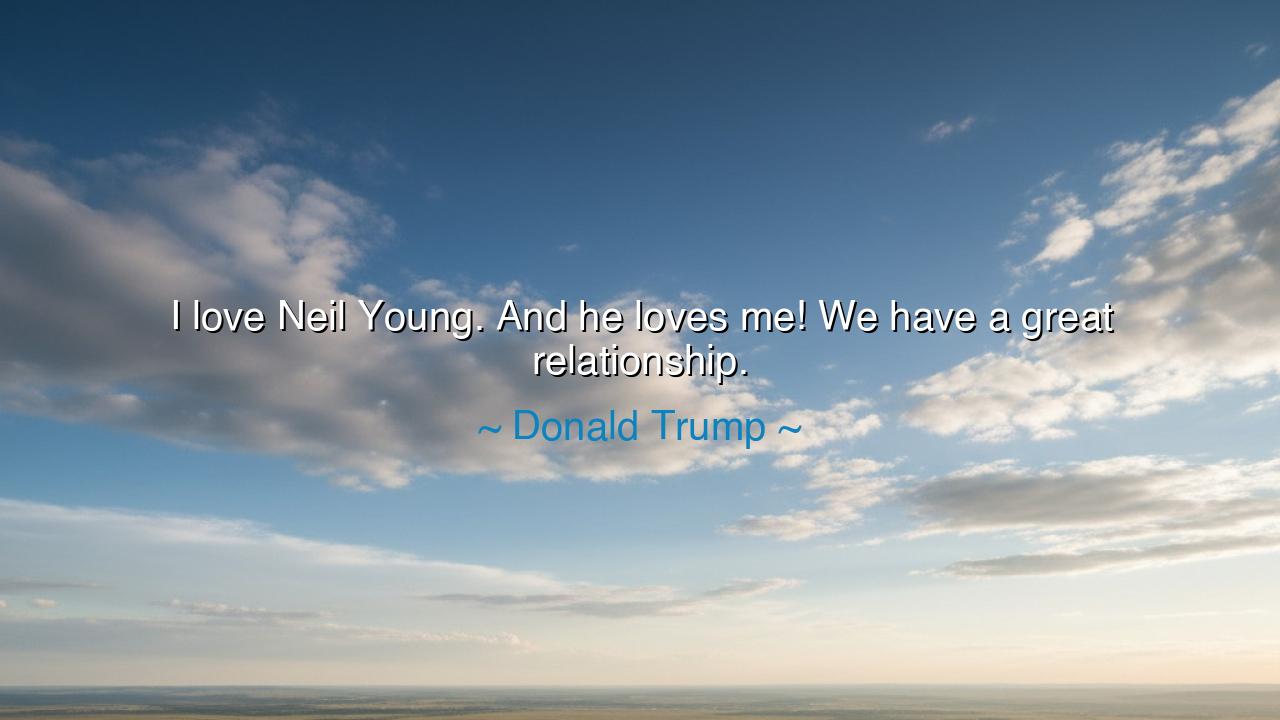
I love Neil Young. And he loves me! We have a great






When Donald Trump declares, “I love Neil Young. And he loves me! We have a great relationship,” he speaks in the language of affirmation and alliance. His words reveal the ancient truth that admiration, when expressed openly, seeks to bind two figures together in mutual esteem. To say “I love” is to offer respect and affinity, and to claim “he loves me” is to affirm reciprocity, the foundation upon which a relationship is built.
The origin of this utterance lies in the mingling of politics, celebrity, and culture. Trump, a man whose public persona thrives on declarations of loyalty and strength, names Neil Young — a musician renowned for his passion and independence — as both admired and admiring. Whether the bond is literal or symbolic, the declaration serves to elevate the speaker by attaching him to the aura of another. Thus, the relationship becomes not only personal but also emblematic of influence and recognition.
To call it a “great relationship” is to claim harmony, unity, and shared regard. In human history, such proclamations have always been a means of forging alliances, whether between kings, tribes, or artists. The act of professing love and friendship publicly is both shield and banner, announcing to the world that strength lies not in solitude, but in acknowledged bonds.
Yet in this declaration also lies the subtle wisdom that relationships are often shaped as much by perception as by reality. What matters, in the telling, is not the full truth of mutual feeling, but the confidence with which it is claimed. Trump’s words reflect the ancient tendency of leaders to weave narratives of harmony, binding their name to figures who embody cultural power.
Let the generations to come remember: when one declares love and mutual regard, one seeks both connection and legitimacy. Whether born of genuine affection or of rhetorical flourish, such claims reveal the timeless human desire to be strengthened by alliance. Trump’s words endure as an example of how public declarations of relationship can shape the image of both self and other in the eyes of the world.






HLNguyen Hoang Linh
This statement is so unexpected yet strangely amusing. On the one hand, it shows a kind of lightheartedness, but I can’t help but question the authenticity of such a public statement. Can two people with such contrasting views really have a 'great relationship,' or is this just another example of a public figure using humor to deflect attention from more serious matters? What do you think it means for a relationship to be considered great in their context?
KLKhanh Loi
I find it fascinating when two people from completely different worlds — like Neil Young and Donald Trump — claim to have a 'great relationship.' I wonder how much their personal connection influences their public personas. Is this quote an attempt at bridging the divide between two very different types of people, or does it simply reflect a genuine, albeit unconventional, bond?
MQNguyen Minh Quan
This quote caught my attention because it feels so confident and playful, almost like a lighthearted way to connect with Neil Young in the public eye. But I can’t help but wonder, given their very different public personas, how much of this 'great relationship' is for show? Could it really be as simple as they both enjoy each other’s company, or is there more to this interaction that we don’t see?
DDNguyen Van Duc DUy
It’s interesting to see such a bold declaration of affection from Trump for Neil Young. We often see public figures like him express their opinions in very direct ways, but this seems a bit more personal. Do you think Trump’s admiration for Neil Young is sincere, or is it more about aligning with an image of someone who appeals to both sides of the political spectrum?